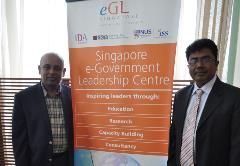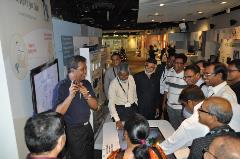Bangladesh is amongst many nations who have benefitted from collaborations with Singapore e-Government Leadership Centre (eGL) to develop and deliver e-government Information and Communications Technology programmes for its people.

Dr Sanaul (right), with eGL Centre Director, Ashok Kumar
Access to Information (a2i) is a project established in 2007 under Prime Minister’s Office of Bangladesh, mandated to drive the vision of Digital Bangladesh and deliver citizen services to their doorsteps. The initiative aims to create a digital nation by improving quality, widening access, and decentralising the delivery of public services to ensure their responsiveness and transparency.
“a2i’s focus is about putting the citizen’s interest first,” explained Dr Shah Mohammad Sanaul Hoque, a2i’s Director of Capability Development.
The programme has four key components:
- To introduce government e-services to its people through mobile or internet use;
- To promote innovation in its public e-service deliveries;
- To establish a self-sustaining environment (ecosystem) for e-services to take root in Bangladesh; and
- To develop the capacity of service providers, which will enable the design and development of state-of-the-art training programmes for future leaders
“To create a Digital Bangladesh, the government has been working extensively with partners both within and outside of our country,” Dr Sanaul elaborated, “and this is where eGL has played a vital role.”
In 2013, a2i signed a memorandum of understanding (MOU) with eGL to collaborate on capacity building, consulting, research and study visits to Singapore.
“Digital Bangladesh sets a clear mandate to leverage on technology and deliver efficient, transparent services. eGL is privileged to be associated with this initiative and is looking forward to contribute and learn,” said Ashok Kumar, Centre Director at eGL.
eGL recently completed a two-week training program on Public Service Transformation. This program covered topics on planning, process re-engineering, change management, cyber security and governance. It also included site visits that demonstrated outcomes of transformation efforts in Singapore.
Ashok Kumar highlighted that, “One of the key features of eGL programmes is the focus on experiential learning, which is accomplished by designing the curriculum with a careful mix of lectures, site visits and workshops, which are delivered by faculty members who are practitioners with rich experience”.
“Through eGL, I’ve gained many practical insights on developing the courses we need in Bangladesh to achieve a2i’s objectives. In particular, there’s been a lot of focus on alignment and collaboration with other concurrent projects in the civil service, to help ensure integration and proper synchronisation of activities,” shared Dr Sanaul.

Besides the classroom lectures, Dr Sanaul and his team were given a tour of Jurong East (in the photo on the right), where they had the opportunity to learn about “TV White Space” and to see how digital white space is being used in Singapore for data communications, power automation and smart metering.
“It’s been especially interesting and relevant, because we’ve been trying to overcome various connectivity issues back home. Through the field visit, we were able to exchange views on implementation and challenges, and learn from Singapore’s experiences how white space can be used in the Bangladesh context.”
Dr Sanaul is optimistic about a2i and the overall objective to create a Digital Bangladesh. “We must first elevate our mindsets,” he said, when asked about the key shifts that will be necessary for success. “We need to start thinking like a service provider and relinquish the leader/master mindset inherited from the past.”
He affirmed that many public sector organisations in Bangladesh were already on the journey towards citizen-centricity, and believes that education would be an essential component across all e-Government projects.
“To achieve a Digital Bangladesh, we must be willing to shift gears, gain tangible knowledge and skills, and work with experienced organisations like eGL to translate those principles into action. The sky is the limit,” he added.
For more information on eGL programmes, please visit www.egl.nus.edu.sg